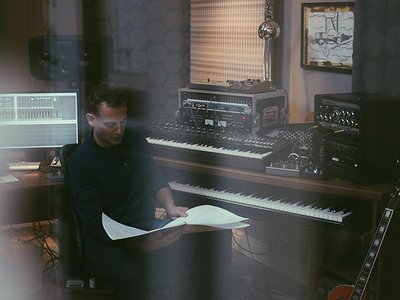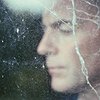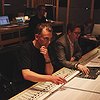Part 2
What are currently some of the most important tools and instruments you're using?
I think the new software emulations of old analogue gear are really useful – things like the UAD card and plug-ins. I am also using more and more analogue keyboards these days in my work; there is something very satisfying about tweaking the knobs on a Moog synth when recording audio tracks in Logic Pro.
Before I start composing I often build up a rough template of the sounds that I may use in the composition. It is a bit like selecting my players for the orchestra. So every composition has a very distinct sound world and patches/sounds are then easily selected. I spent too many years working with artists who would spend a couple of hours or more searching for a bass sound – I try and avoid this where possible. Once I have a composition in a rough state then I may leave it for a few days. Coming back to it fresh gives me so many new ideas and it can really inspire me. It is at this stage that I may begin to refine and mound the sounds.
The unique sound world that I can create appeals to film and television directors, who are looking for an original ‘sound’ for their soundtrack.
Many contemporary production tools already take over significant parts of what would formerly have constituted compositional work. In which way do certain production tools suggest certain approaches, in which way do they limit and/or expand your own creativity? Are there any promising solutions or set-ups capable of triggering new ideas inside of you as a composer?
There are now many production tools that can create very high quality professional sounding tracks (loops of music or beats that already sound like finished tracks) – I just don’t use them. It does not interest me and I would rather sculpt a sound from scratch: create something out of an unusual instrument lying around the studio than start with an ‘off the shelf’ sample library patch. I also work with fantastic musicians; the other day I was recording a viola da gamba player on some tracks and it was incredibly inspiring. He was playing my printed music arrangements but then maybe trying the parts with different bowing techniques and positions. The juxtaposition of this medieval instrument with very contemporary sounds and textures in the track created something quite unusual.
Could you describe your creative process on the basis of a piece or album that's particularly dear to you, please? Where do ideas come from, what do you start with and how do you go about shaping these ideas?
Sometimes ideas come to me randomly when I am just walking my dog, and other times they may come when I am working on a completely different project. I try to record them when they are in my head so that they can be developed at a later date.
The track ‘Our Story’ on my album Seven Days was based around a 12 bar repeating bass sequence. I wanted to create a 21st Century version of the Baroque idea of having a bass that repeats (ground bass) and then building the track on top. The most well known piece is probably Pachelbel’s Canon. With ‘Our Story’ the bass sound is made up of low piano, harp and a bass patch on a synth. On top of this bass part I then introduced real strings that slowly develop and build throughout the track. Other electronic lines weave in an out of the textures.
I prefer to build up tracks over time and slowly hone and sculpt the soundscape; by the end I’ll have hopefully created something quite original.
With more and more musicians creating than ever and more and more of these creations being released, what does this mean for you as an artist in terms of originality? What are some of the areas where you currently see the greatest potential for originality and who are some of the artists and communities that you find inspiring in this regard?
For me originality means starting with original sound sources: my own bespoke sounds and patches. There are many great artists and composers producing lovely tracks using a lot of ‘off the shelf’ sound libraries but I don’t want to sound like them.
I think that quality will always prevail in music, and that is especially true in film & TV soundtracks. There are still a lot of great soundtracks being composed but there are also a lot of mediocre ones. The abundance of recording technology has really widened the field in this world.
Directors and producers are always looking for originality and that includes the soundtrack. I am lucky to be working with great directors on inspiring scripts and projects. With television going through such a golden age we are in exciting times.
How strictly do you separate improvising and composing?
Sometimes I hear a fully finished track in my head before I even sit down at a keyboard. The process is then all about the best way to transcribe my idea onto a page of manuscript so that when the musicians come on for the session it sounds exactly how I imagined it would.
On the other hand there are many times when I enjoy sitting down at a piano and just playing and improvising. Sometimes I may record these ideas onto my phone and come back to them at a later date. Sometimes I record them straight into Logic Audio and then play around with edits.
I recorded the very simple opening piano motif of Opus Einn as one of these long improvised takes, but I wanted to develop the track in a more musical way. So I went back to the piano and began to work out the rest of the piece, but the initial inspiration came from a long recorded take of me improvising on piano.
How do you see the relationship between sound, space and composition and what are some of your strategies and approaches of working with them?
That is a great question and I see all three of these as being important in equal measures. Picasso once said ‘it has taken my whole life to be able to paint like a child’. I think that is a lovely quote and I can really relate to it. I think that music can be most effective when there is a lot of space in a composition. Sometimes composing is not about adding more parts but rather distilling the parts that are already there into something more elegant and simple.
When I am composing music for a film or television drama I am very aware of sound, space and composition. The music is often the third element in a film, the first two being the picture and sync sound (dialogue and FX). So the choice of every single element in the music is incredibly important. I believe that music works best in film when all these things are considered.
Even when I worked on the tracks for my album Seven Days, I was aware of space in the music. I usually have strong visual images in my head when I am composing and that enables me to give the music space. Every sound choice in my compositions is very carefully considered.








